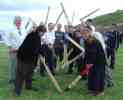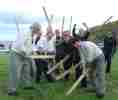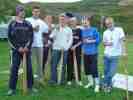|
INITIATIVE AT THE EDGE ANNUAL
CONFERENCE IatE was established in 1998 to develop a community led, multi agency approach to regenerating selected areas designated as the most economically and socially fragile in the Highlands and Islands.
The annual conference gives community members and local development officers from each of the 10 IatE areas the opportunity to meet and discuss similarities between their areas and to share ideas to ensure they all have the best information and resources available to solve problems familiar to each of these remote areas. The event also brings the local development officers together with the Minister from the Scottish Executive and all partner agencies. This leads to open discussion on ways to develop common themes and aspirations in addressing local needs. Southeast Caithness is one of the 10 designated IatE areas - as are Isle of Jura and Isle of Coll (Argyll), Glenelg and Arnisdale (Highland), Northmavine with North Isles - Unst, Yell and Fetlar (Shetland), Lochs with Barra and Vatersay (Western Isles). Eday and Stronsay with Sanday and North Ronaldsay (Orkney). Being designated within IatE gives areas priority status among local and national public bodies. These 10 areas were introduced to the Initiative in 2004 succeeding the original eight pilot areas. Allan Wilson MSP said: "The Initiative at the Edge fits well as part of the wider agenda for a modern, prosperous and socially just Scotland for the 21st Century. "There can be no doubt about the commitment of IaTE communities playing their role to reverse past trends of decline and while the Initiative's method might be different the concept of partnership between communities and the public and private sector is one that can be seen again and again to be delivering long-term sustainability across more and more of our remote communities in Scotland."
"The primary aim of IatE is to develop community capacity to deal with the problems and look for opportunities. Agencies and partners realise that this is different in each location and takes considerable time and effort to achieve, that is why extended timescales are a feature of IatE." Tuesday's (20th Sept) event included workshops with a panel from Highland and Islands Community Capacity Programme, Crofting Community Development Scheme, Highlands and Islands Enterprise's Community Land Unit, and Communities Scotland. On Tuesday evening there was a special treat for the visiting delegates. A local team put on a demonstration of the world famous sport knotty. Knotty is a traditional, contact sport involving the use of sticks fashioned from old fish boxes and floats from old fishing nets! Today (Wednesday 21st) sees members go on various site visits to community projects in the area. Talking about the event Hugh explained: "We meet to share experiences and learn from the past activity of the Initiative. It's about ways in which we can help our communities to benefit from our natural assets - our people and our place. The objective is to look outwards in order to search for new ways of doing things, new ways of tackling the problems we face and taking all the opportunities which present themselves. "It is great that community representatives from as far north as Shetland and as far south as the Islands of Jura and Coll are able to attend the event." High on the agenda of topics covered was the need to sustain community company groups to living, breathing social companies with recognised talents and expertise. Workshops looked at how to support the development of social enterprises and the move from non-profit and grant dependency to 'more-than-profit' and financial sustainability through income generating and trading. Other workshops included, community land and benefits; marine resources; land use and development; Communities Scotland regeneration funding and lifelong learning and skills. |




 Hugh Donaldson, co-ordinator of IatE,
said: "The Initiative is about community led development and it can only
succeed when communities engage effectively with the partner agencies of
the Initiative to formulate and deliver realistic and achievable
development plans for their communities.
Hugh Donaldson, co-ordinator of IatE,
said: "The Initiative is about community led development and it can only
succeed when communities engage effectively with the partner agencies of
the Initiative to formulate and deliver realistic and achievable
development plans for their communities.